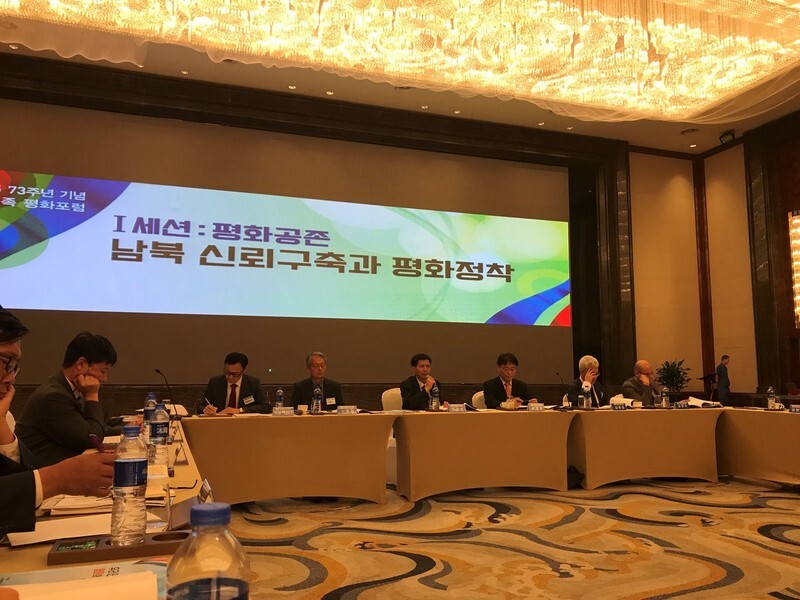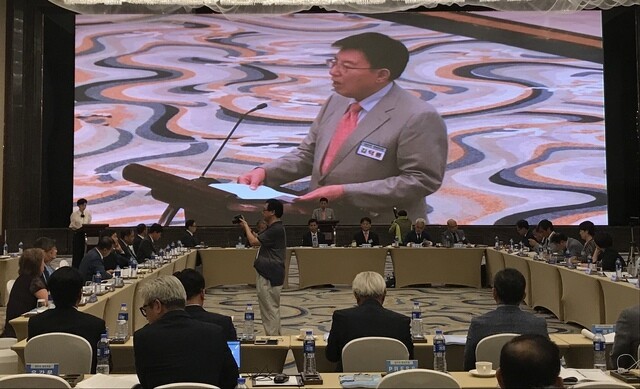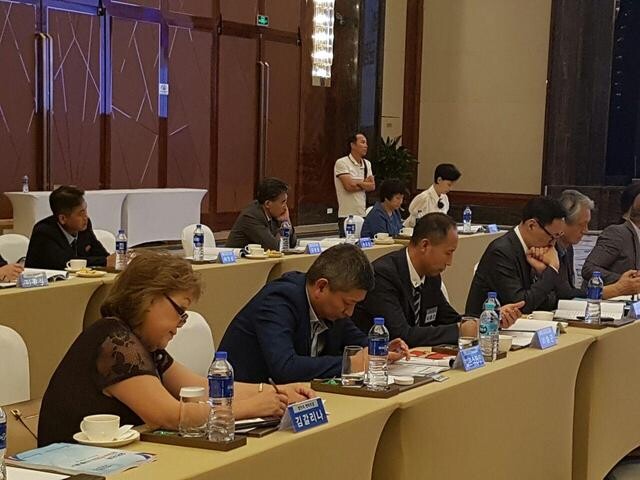hankyoreh
Links to other country sites 다른 나라 사이트 링크
Koreans from South, North and overseas gather to discuss methods for peace

Koreans from the South and North and overseas gathered together in hopes of achieving the peace, prosperity and unification on the Korean Peninsula that were promised in the Panmunjom Declaration on April 27.
The Pan-Korean Peace Forum drew to a close in Shenyang, China on Aug. 24. The event was held in conjunction with the celebration of the 73rd anniversary of National Liberation Day (Aug. 15), and hosted by The National Unification Advisory Council, an advisory body to the president led by Executive Vice Chairperson Kim Deok-ryong, as well as the Hankyoreh Foundation for Reunification and Culture, led by Director Jeong Se-hyeon.
Under the theme, “The start of a new age of peace and prosperity, as a people,” the forum was the first time since the Panmunjom Declaration that South and North Koreans joined overseas Koreans to find a way to implement it.
Experts from the South recommended an approach that would consist of creating a positive cycle through the construction a system of peace and denuclearization on the Korean Peninsula. The delegation from the North emphasized the importance of mutual Korean cooperation through the establishment of a peace regime and a process that would propel joint prosperity. The overseas Koreans determined that their most effective role would be in using the influence they have in many places around the world to push for the fulfillment of the declaration.

The forum was originally scheduled to be held in Dandong on Aug. 23, but in the process of deliberating over the scale of the event and the specifics of procedure, the date and place were adjusted, so the event was held in Shenyang.
The need for preemptive arms control as prerequisite for end-of-war declaration
In the first session, on the topic of peaceful coexistence, Kim Dong-yeop, the head of research at the Kyungnam University Institute for Far Eastern Studies, said, “In order to establish a fixed peace on the Korean Peninsula, we need a three-in-one roadmap that connects three tasks in a cycle of positive returns, those being the North Korean nuclear problem, a peace regime and arms control.”
Kim continued, "Until now, the peace regime process has been negotiated, starting with denuclearization, arms control and so on.” He stressed, "We need to create a new step-by-step approach that is also simultaneous and comprehensive”
Through pre-emptive arms control, we can accelerate the denuclearization of the Korean peninsula and the finalization of the peace treaty [. . .] It is necessary for the two Koreas to find a way to organize their own talks.”
Ri Son-woong, head of the Fatherland Unification Research Institute, said, "Permanent peace on the Korean peninsula is a prerequisite for the development of North-South relations and the unification of the nation." He continued, "As stated in the Panmunjom Declaration, we must declare the end of the war this year." The declaration is an essential requirement for peace in the Korean Peninsula. "The United States, as a key player in the Korean War and armistice, is responsible for declaring the end of the war," he said. “In any case, the rejection of the declaration cannot be justified.”
Waseda University Professor Lee Jong Won participated as a panelist saying, “The summits between the Koreas and the US and North Korea have given us a historical opportunity to bring peaceful coexistence to the Korean peninsula. The continuous and institutionalized cold war era North-South conflict and the new cold war framework cast on Northeast Asia must be overcome.”
Mutual prosperity in which North and South are equal economic agents
In the second session, Lim Lyong-cheol, Vice Chairman of the National Reconciliation Council, presented on the topic of mutual prosperity as a representative of North Korea.
Lim expressed his regret regarding the speed of economic cooperation, stating "Since the Panmunjom Declaration, a variety of cooperative projects have been carried out for various purposes, but there has been little progress in the area of economic cooperation." He said, "The carriage of the Panmunjom Declaration can only move forward if the two wheels of peace and prosperity roll together," he said. "If the wheel of prosperity is stopped the way it is now, there will be no progress."
He continued, "We should not be obsessed with cooperating with foreign countries. We must realize economic cooperation between the two Koreas. [. . .] We must make the rules and norms necessary to develop the national economy according to our own needs and interests." He stressed, "North-South economic cooperation is based on equality between the North and South and on the principle of mutual aid and benefit. It should not be mistaken as a preference for either side."
South Korean presenter and Vice President of IBK's Korea Institute for Industrial Economics and Trade, Cho Bong-hyun stated "Economic cooperation will be phased step-by-step depending on the progress of the denuclearization process. [. . .] It is necessary to prioritize economic cooperation based on the implementation of the Panmunjom Declaration. Cho continued, "The Moon Jae-in government's plan is to create a new growth engine for the national economy and expand the economic territory of the Korean peninsula to Eurasia. [. . .] For the balanced development of the national economy, it is necessary to establish a common idea of inter-Korean cooperation with North Korea's economic development zone. [. . .] It is necessary to establish a cooperative system with neighboring countries, such as linking the North-South joint initiative with China's One belt, One road Initiative, and Russia's New Eastern policy."
"Mutual respect is the premise of the balanced development of the national economy," said Kwon Hyuk-chul, the President of the Hankyoreh Peace Research Institute. "It is necessary to recognize the North as an equal economic entity. [. . .] From the outset, it is necessary to cooperate with the labor-intensive industries and the technology-intensive industries in order to examine the effectiveness of the division of labor model that combines the low-wage labor and abundant resources in the North with the capital and technology in the South.”

Throughout the third session on the subject of unification, every panelist pointed out that the peacemaking process on the Korean Peninsula requires the encouragement and support of overseas Koreans and the efforts of the two Koreas in order achieve unification.
In his presentation, Korean Institute of National Unification (KINU)Director Kim Yeon-cheol said, "A political policy of reconciliation and healing must be in place to overcome confrontation and division between the two Koreas and at home and abroad as stated in the Panmunjom Declaration. [. . . ]The process of making peace on the Korean peninsula should be focused on reunification, not on division. [. . .] The North and South agreed in the June 15th Joint Declaration that there are commonalities between the South's confederation proposal and the North's lower-level federal proposal. We will continue to systematize the common points between the two South and North unification measures."
He proposed a joint research between the South Korea Institute for National Unification and the North Korean Research Institute for National Unification, and insisted that a democratic balance be created to provide space for reconciliation, peace and reunification in the homeland of overseas Koreans.
North Korean presenter Jong Gi-Pung, head of the Fatherland Unification Research Institute stated, "We will achieve national peace, unification and prosperity through the strength of our people and solve all issues with a 'our people' first mindset. [. . .] The first clause, the first item in the Panmunjom Declaration is the principle of national independence, which determines our own destiny."
He urged the overseas Koreans to play an active role, saying, "The Panmunjom Declaration should be promoted as a rough guide to the new era of independence and independence. [. . .] The first clause, the first item in the Panmunjom Declaration is the principle of national independence, which determines our own destiny."
Lee Hye-sook, a director of the Women's Council for Peace, said, "Overseas Koreans have relatively easy access to the South and the North freely. [. . .] I hope they will serve as messengers for peace and help aid understanding on both sides."
By Yu Kang-moon, senior staff writer
Please direct comments or questions to [english@hani.co.kr]

Editorial・opinion
![[Column] Park Geun-hye déjà vu in Yoon Suk-yeol [Column] Park Geun-hye déjà vu in Yoon Suk-yeol](https://flexible.img.hani.co.kr/flexible/normal/500/300/imgdb/original/2024/0424/651713945113788.jpg) [Column] Park Geun-hye déjà vu in Yoon Suk-yeol
[Column] Park Geun-hye déjà vu in Yoon Suk-yeol![[Editorial] New weight of N. Korea’s nuclear threats makes dialogue all the more urgent [Editorial] New weight of N. Korea’s nuclear threats makes dialogue all the more urgent](https://flexible.img.hani.co.kr/flexible/normal/500/300/imgdb/original/2024/0424/7317139454662664.jpg) [Editorial] New weight of N. Korea’s nuclear threats makes dialogue all the more urgent
[Editorial] New weight of N. Korea’s nuclear threats makes dialogue all the more urgent- [Guest essay] The real reason Korea’s new right wants to dub Rhee a founding father
- [Column] ‘Choson’: Is it time we start referring to N. Korea in its own terms?
- [Editorial] Japan’s rewriting of history with Korea has gone too far
- [Column] The president’s questionable capacity for dialogue
- [Column] Are chaebol firms just pizza pies for families to divvy up as they please?
- [Column] Has Korea, too, crossed the Rubicon on China?
- [Correspondent’s column] In Japan’s alliance with US, echoes of its past alliances with UK
- [Editorial] Does Yoon think the Korean public is wrong?
Most viewed articles
- 1[Column] Park Geun-hye déjà vu in Yoon Suk-yeol
- 2Thursday to mark start of resignations by senior doctors amid standoff with government
- 3[Editorial] New weight of N. Korea’s nuclear threats makes dialogue all the more urgent
- 4Will NewJeans end up collateral damage in internal feud at K-pop juggernaut Hybe?
- 5Why Korea shouldn’t welcome Japan’s newly beefed up defense cooperation with US
- 6[Guest essay] The real reason Korea’s new right wants to dub Rhee a founding father
- 7Kim Jong-un expressed ‘satisfaction’ with nuclear counterstrike drill directed at South
- 8[Column] ‘Choson’: Is it time we start referring to N. Korea in its own terms?
- 9N. Korean hackers breached 10 defense contractors in South for months, police say
- 10[Column] Yoon’s first 100 days should open our eyes to pitfalls of presidential system